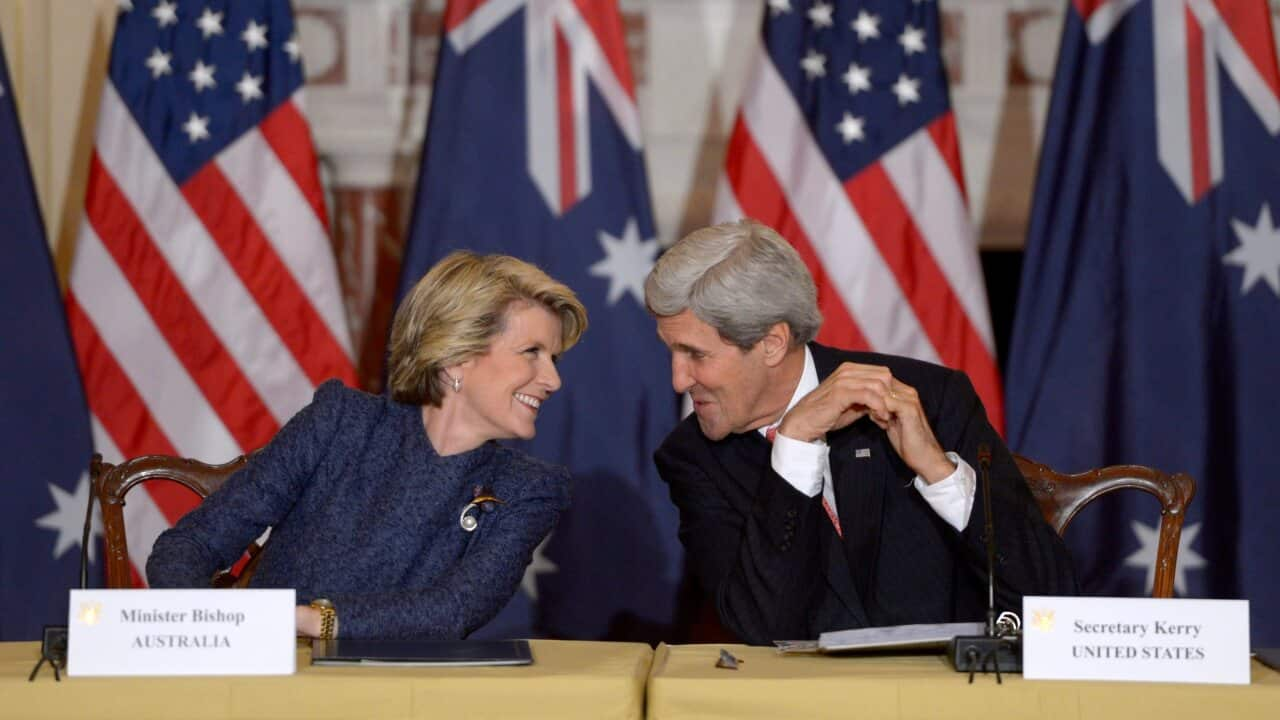(Transcript from World News Australia Radio)
Australian Foreign Minister Julie Bishop and U-S Secretary of State John Kerry have remained tight lipped over allegations the two countries colluded to tap the phone of Indonesian President Susilo Bambang Yudhoyono.
Meeting in Washington to discuss bilateral operations in a grouping known as AUSMIN, Mr Kerry told the press that the United States enjoys an "unbreakable and a critical" working relationship with Australia and that the two would continue to work together on global counter-terrorism activities.
But when pressed on US involvement in the Indonesian phone-tapping allegations, both Ms Bishop and Mr Kerry declined to comment.
Abby Dinham reports.
(Click on audio tab above to listen to this item)
"We just don't talk about intelligence matters in public and we're not about to begin now.//We do not discuss intelligence matters, certainly not allegations we do not discuss them publically and we will not do so."
Australian Foreign Minister Julie Bishop continually repeated the party line when questioned about Australia's spying activities in Indonesia.
Documents leaked by National Security Agency whistleblower Edward Snowden suggest Australia tapped the mobile phone of President Yudhoyono, his wife and those of cabinet colleagues and close advisers in August 2009.
United States Secretary of State John Kerry refused to entertain a question as to possible U-S involvement in the operation.
But when asked if Australia should issue a formal apology - along the lines of President Barack Obama's apology to Germany over a phone tapping controversy involving German Chancellor Angela Merkel - he remained diplomatic.
"We have worked together on counter terrorism and many activites on a global basis and we will continue to. Likewise we have great respect and affection for Indonesia, we work with our friends in Indonesia on many different issues. But whatever has been or not been released or been discussed in the papers I believe as I think our friends in Australia do is a matter of intelligence."
The comments came as protests erupted in the Indonesian city of Yogyakarta.
Demonstrators have reportedly burnt the Australian flag in anger over the presidential phone tapping scandal.
Indonesian President Susilo Bambang Yudhoyono says he'll write to Prime Minister Tony Abbott to demand an official apology and a full explanation.
(trans) "The illegal surveillence of Indonesia towards a number of state officials, including myself, it is something that is very difficult for me to understand. I find it difficult to understand why such activities must be conducted. It is no longer the era of cold war.
Dr Yudhoyono also stated that he wanted a personal explanation, insisting comments directed at Australia's domestic community would not suffice.
But so far, Tony Abbott has remained unapologetic over the allegations.
Mr Abbott told Parliament that he'll respond to the official communication from Doctor Yudhoyono.
But rather than apologise for any actions by Australian spies, the Prime Minister instead lay the blame for the controversy on the media for embarrassing Indonesia's president.
"I want to express here in this chamber my deep and sincere regret about the embarrassment to the President and the chamber that's been caused by recent media reporting."
Professor Damien Kingsbury, from the School of International and Political Studies at Deakin University, says the breakdown of relations across the Timor Sea is the most serious in more than a decade.
"It's certainly on scale of the fallout over Australia's intervention in East Timor in 1999, when military cooperation was ended at that time and possibly it could be regarded as even worse given this time they were quite united and Australia doesn't have the backing of the international community."
Professor Kingsbury says that even if Mr Abbott delivers a personal explanation and a public apology to Doctor Yudhoyono, it's unlikely relations between the two will fully recover.
"It's very unlikely that President Yudhoyono, even if there is an apology and he accepts it that the relationship will return to what it was only a few weeks ago that is gone. I think the real question now is what happens after President Yudhoyono leaves office next year.
Share

